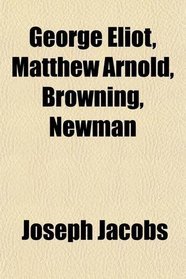Search -
George Eliot, Matthew Arnold, Browning, Newman
George Eliot Matthew Arnold Browning Newman
Author:
Purchase of this book includes free trial access to www.million-books.com where you can read more than a million books for free. This is an OCR edition with typos. Excerpt from book: ROBERT BROWNING NE by one the Dii majores are leaving us: Carlyle, George Eliot, Matthew Arnold; and now Robert Browning, a greater name than all these, has p... more »
Author:
Purchase of this book includes free trial access to www.million-books.com where you can read more than a million books for free. This is an OCR edition with typos. Excerpt from book: ROBERT BROWNING NE by one the Dii majores are leaving us: Carlyle, George Eliot, Matthew Arnold; and now Robert Browning, a greater name than all these, has p... more »
ISBN-13: 9780217255080
ISBN-10: 0217255086
Publication Date: 8/10/2009
Pages: 74
Rating: ?
ISBN-10: 0217255086
Publication Date: 8/10/2009
Pages: 74
Rating: ?
0 stars, based on 0 rating
Genres:
- Biographies & Memoirs >> Leaders & Notable People >> Religious
- Literature & Fiction >> General >> Literary




